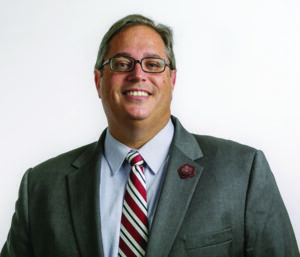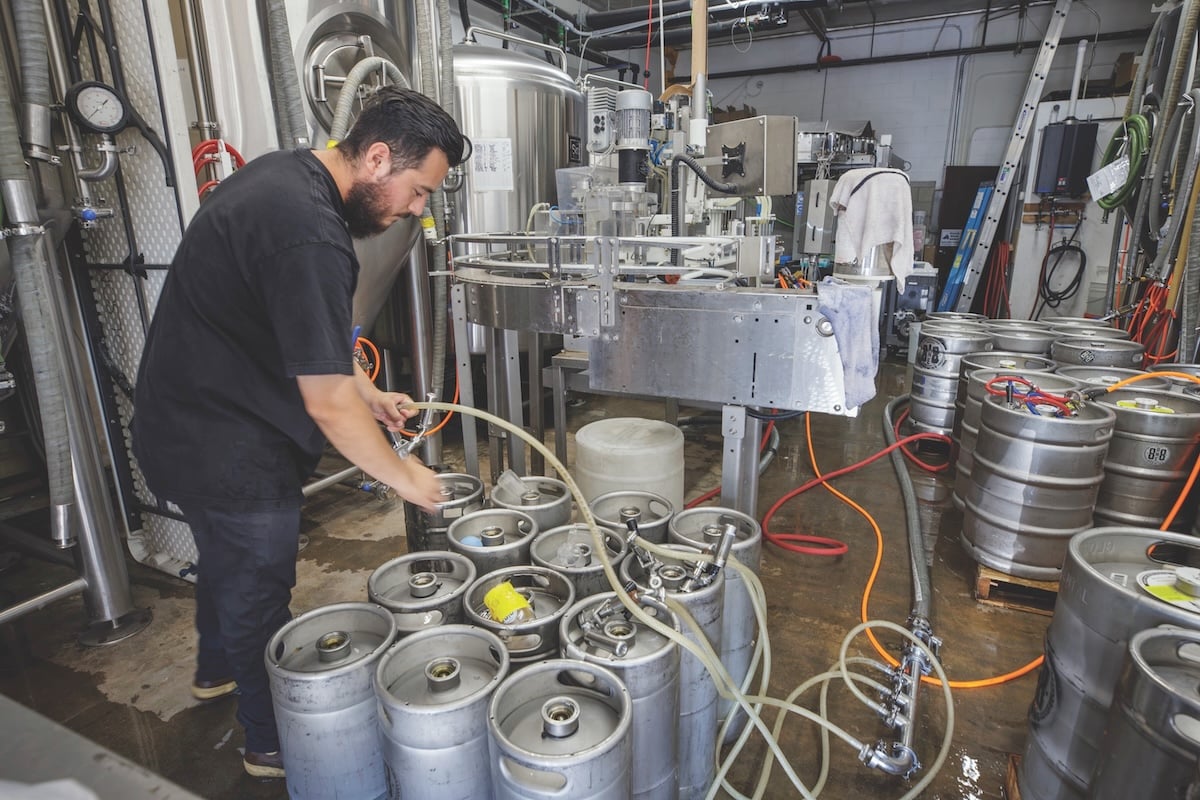Business and labor interests are gearing up to fight an all-out war at the ballot box next year in the city of Los Angeles, with high stakes for the future of businesses in the city.
Six measures are aiming for next year’s citywide ballots. Four of those measures have been put forward by a labor union, including one to raise the minimum wage for all workers in the city to $30 an hour. Another is a referendum on a labor-backed tourism wage ordinance that business groups want to challenge at the ballot box. And the last one is sponsored by business groups seeking to repeal the city’s gross receipts tax.
The business-backed referendum and repeal measures represent a first for modern times in Los Angeles: business groups going on the offensive, directly engaging labor at the ballot box.
“This represents a counterattack by business interests,” said Fernando Guerra, professor of political science at Loyola Marymount University in Westchester and founding director of the university’s Thomas and Dorothy Leavey Center for the Study of Los Angeles.
“After more than a quarter century of trying to lobby the (city) council and the mayor to at least moderate some of the measures coming from labor, business interests are borrowing from the playbook of the unions and the progressive coalition, using the initiative process as their counterattack strategy,” Guerra added.
If all or most of these measures ultimately qualify for either the June primary ballot or the November general election ballot next year, the outcome could determine the overall business climate in the city for decades to come.
Tourism wage battle
In May the City Council passed – and Mayor Karen Bass signed – an ordinance backed by hotel employee union Unite HERE Local 11 to raise the minimum wage for large hotels and private sector airport workers in stages to $30 an hour by July 1, 2028. The Summer Olympic and Paralympic Games are set to begin in Los Angeles days after that.
But this proved the last straw for business groups.
First, a coalition of hotel owners, airlines and other airport-related businesses sought to place the ordinance on citywide ballot next June as a referendum, with the strategy to campaign against it.
What followed was a contentious signature-gathering effort to qualify the referendum for the ballot. The coalition submitted more than 140,000 signatures, well over the 93,000-signature threshold required. But labor groups challenged the signature gathering process at every turn, claiming referendum backers duped people into signing the petitions, among other things. The city clerk’s office is expected to certify the referendum for the ballot in coming days, but legal challenges from Unite HERE Local 11 could ensue.
Labor retaliates
Within just a few weeks of the referendum being filed with the City Clerk’s office, Unite HERE Local 11 retaliated with a slate of four initiatives aimed at next year’s ballot. All four measures have received title and summary designations from the city clerk’s office but are still awaiting clearance to begin signature gathering.
The first would take the tourism wage ordinance and extend it to all businesses that operate in the city, raising the minimum wage in stages until it reached $30 an hour by July 1, 2028.
According to the union’s announcement, the measure was in response to one of the arguments from the hotel industry against the tourism wage ordinance that it was being unfairly singled out.
But business leaders say this rapid wage increase would be catastrophic for business in the city.

“If this $30 minimum wage for all businesses in the city passes, there will be layoffs in droves and an exodus of businesses from the city to neighboring cities on a massive scale,” said Stuart Waldman, president of the Valley Industry and Commerce Association.
‘Voters should get a say’
The second measure would require a citywide vote on all hotel and event center development projects that receive financial assistance from the city. It would also require voter approval for development of all future hotels over 80 rooms and all event centers with more than 50,000 square feet or 1,000 seats, regardless of whether those projects receive city financial assistance.
Kurt Petersen, co-president of Unite HERE Local 11, said that many of the companies behind these projects may not need the taxpayer subsidies.
“We question whether big companies that find tens of millions to pay their CEOs each year and are now spending millions more to overturn a minimum wage hike for their lowest-paid workers really need these subsidies,” Petersen said in the announcement. “At the very least, voters should get a say on whether their tax dollars should be handed over to these corporations.”
But in recent weeks, concerns have mounted from city elected officials and business leaders that this measure could also apply to venues for the 2028 Olympics, especially temporary venues, such as those in San Pedro for aquatic events. If those venues end up being rejected by voters, then the venues could be forced into neighboring cities that would have little time to prepare.
Meanwhile, the Central City Association that represents downtown businesses and property owners is concerned the measure could delay or scuttle one of its longtime goals: expansion of the Los Angeles Convention Center.
“The Central City Association has been at the center of efforts to advance and resuscitate this project, so we’re very concerned,” said Nella McOsker, the association’s chief executive.
CEO pay measures
Unite HERE’s other two proposed ballot measures target chief executive pay. The first would impose a 0.5% surcharge on the city’s gross receipts tax for companies with more than 500 employees that pay their chief executives more than 100 times their Los Angeles median employee.
The other measure would require voter approval of city contracts with companies with at least 100 employees nationwide where the compensation for the highest-paid managerial employee is more than 100 times greater than the median compensation for employees based in the city. It would apply only to contractors that use city real property, such as leaseholders or concessionaires.
“If large corporations are contributing to inequality, such as by paying their CEOs extreme amounts of money while at the same time failing to pay workers a living wage, I believe that it’s only right that those companies should pay more in taxes for the things the city needs,” Maria Torres, a dishwasher at Chicago-based airport contractor Flying Food Group said in Unite HERE’s announcement. “If big companies that are contributing to inequality want to profit by using the public’s property, voters should get some say,” Torres added.
Like with the event center measure, business leaders warn of unintended consequences if this measure should ultimately pass.
“When a major studio is filming here, they often use city streets for their filming,” said McOsker of the Central City Association. “This could undercut all the efforts that have been put into luring filming back into the city.”
Business tax repeal
The measure put forward by the Central City Association, Valley Industry and Commerce Association and other business groups to repeal the city’s gross receipts tax as of Jan. 1, 2028, is the latest attempt in a decades-long effort to get rid of the tax.
Business groups have long complained that the tax imposes an unfair burden because it is levied on top-line revenues, regardless of whether the business is making or losing money. The tax has often been cited in decisions by businesses to leave the city. One prominent example: online legal documents company LegalZoom.com Inc., which relocated its headquarters in 2010 to Glendale from Hollywood.
The gross receipts tax currently brings in more than $800 million a year to city coffers. But proponents of its repeal contend that removing the tax entirely would spur more business creation and migration into the city, greatly boosting sales tax, hotel bed tax and other city tax revenues.
According to proponents, the impetus for the current repeal drive was the increasingly unfavorable conditions for businesses in the city.
“The city is becoming increasingly unaffordable,” said Bryan Olson, co-owner of 8one8 Brewing in Canoga Park and board chair of the Greater San Fernando Valley Chamber of Commerce.
“The whole concept of basing a tax on gross receipts just adds to the costs. Los Angeles is one of only four cities in the state that does this and it’s driving businesses away.”
But assuming the measure does qualify for next year’s ballot, Guerra of Loyola Marymount University said it will face an uphill battle to win voter approval.

“The city establishment and the unions will come out against this, because if it passes, it will have very immediate and severe impacts on the city budget,” he said.
Backers of the repeal measure say they hope these potential impacts convince city leaders to enter talks with business to reach a compromise.
As for the other ballot measures, Guerra said Unite HERE’s main effort will be to get out the vote to uphold the tourism wage ordinance and, possibly, to vote for the citywide minimum wage increase to $30 an hour. He believes the other three measures Unite HERE Local 11 put forward may be used as bargaining chips in future talks with city officials or could be set aside entirely.
In the meantime, he said, the battle lines on all these measures will be sharpened over coming weeks and months.
“We’ve never seen a battle like this in recent city history,” he said.